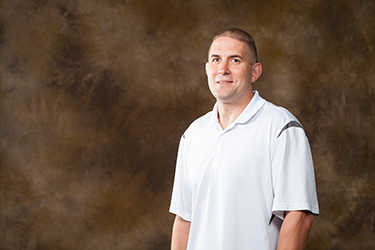NSF Grant Will Further Research on Models of Self-Assembling Systems
FAYETTEVILLE, Ark. – University of Arkansas computer scientist Matt Patitz will receive a nearly $440,000 grant from the National Science Foundation to further his research in the development of theoretical and computational models of self-assembling systems.
The models simulate or mimic complex biological processes, such as evolution, self-replication and immune system behaviors, and the formation of prions, protein particles that may cause brain diseases. The models can be used to help scientists develop artificial self-assembling systems in laboratories and will make valuable contributions to the theoretical understanding of biological systems.
A variety of self-assembling systems exist in nature, occurring when individual molecules combine autonomously. They obey local rules of behavior with no external guidance or placement to form complex structures. This process is responsible for the formation of many inorganic structures, such as crystals (like snowflakes), and numerous biological structures, including cellular membranes and viruses.
Theoretical computer science has provided numerous insights into the creation and understanding of these systems.
Patitz, an assistant professor of computer science and computer engineering, is collaborating with other researchers to develop artificial self-assembling systems to create advanced materials and complex nanoscale structures and to perform molecular computing. They have conducted laboratory experiments as well as mathematical and computational modeling.
Patitz’s project has two components. The first consists of a series of studies that will examine the ability of various theoretical models to simulate each other when certain parameters are fixed, especially the so-called “temperature” parameter, which makes some cooperative behaviors difficult or impossible. He will explore whether certain models with fixed parameters are intrinsically universal.
The second component focuses on the ability of various self-assembling systems to simulate complex and important biological activities. Patitz will employ an existing model, the Signal-passing Tile Assembly Model, which uses dynamically changing basic components. He will also develop a new model, based on two-dimensional components that can fold along their boundaries to form 3-D structures. These “foldable” building blocks will be developed with special focus on their ability to abstractly mimic protein-like behaviors.
Patitz’s work consists of mathematical and computational modeling using simulation software. The project’s results and software will be made available to researchers at no cost.
Contacts
Matt Patitz, assistant professor
College of Engineering
479-575-5590,
patitz@uark.edu
Matt McGowan, science and research communications officer
University Relations
479-575-4246,
dmcgowa@uark.edu
Headlines
Native American Student Association to Host Annual Choctaw Stickball Tournament
Competition begins at 10 a.m. Saturday the the University Recreation fields on Razorback Road. Carly Keats, a star Razorback basketball player, will play for her home team from Choctaw, Mississippi.
Department of Music Professor to Teach at Italian Festival in June
Richard Rulli, associate professor of trumpet in the Department of Music, has been invited to teach at TrumpetFest June 16-23 in Orvieto, Italy.
Bumpers College Names Senior Scholars, Outstanding Departmental Students
Twenty-five students from 10 different majors and concentrations in Bumpers College were named Senior Scholars for 2023-24, and each department has named its outstanding students for the year.
Music Education Students Bring Fun to Child Development Center
Interactive music sessions known as "music zoos" bring creative learning of musical instruments to the children in the center, as well as providing the music education students the chance to practice their teaching skills.
New Faculty Teaching Portfolio Authors Recognized
The faculty members successfully completed the Teaching Portfolio and will be recognized at the Fall Teaching Awards ceremony hosted by the Cordes Teaching and Faculty Support Center and the Teaching Academy.





